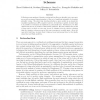Free Online Productivity Tools
i2Speak
i2Symbol
i2OCR
iTex2Img
iWeb2Print
iWeb2Shot
i2Type
iPdf2Split
iPdf2Merge
i2Bopomofo
i2Arabic
i2Style
i2Image
i2PDF
iLatex2Rtf
Sci2ools
AAAI
2015
2015
Analysis of Equilibria in Iterative Voting Schemes
Following recent analyses of iterative voting and its effects on plurality vote outcomes, we provide a general characterisation of the set of equilibria attainable by iterative plurality voting. We show that deciding whether a given profile is an iteratively reachable equilibrium is NP-complete; however, if truth bias is added, we show that it is possible to determine all equilibria in polynomial time. Furthermore, we fully characterise the set of iterative truth-biased equilibria. We then examine the model of lazy voters, in which a voter may choose to abstain from the election, showing that the iterative voting process in this case converges to a stable state. As in the case with truth bias, we show that it takes at most polynomial time to find stable states that are Nash equilibria.
| Added | 27 Mar 2016 |
| Updated | 27 Mar 2016 |
| Type | Journal |
| Year | 2015 |
| Where | AAAI |
| Authors | Zinovi Rabinovich, Svetlana Obraztsova, Omer Lev, Evangelos Markakis, Jeffrey S. Rosenschein |
Comments (0)

